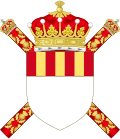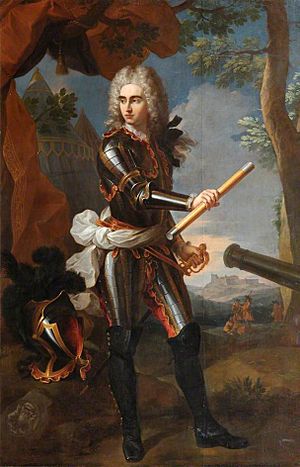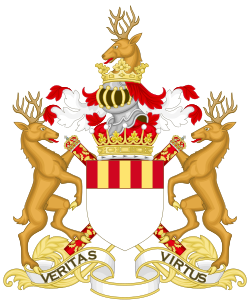Earl Marischal facts for kids
Quick facts for kids Earl Marischal of Scotland |
|
|---|---|

Arms of the house of Keith, hereditary holders of the title of Earl Marischal.
|
|
|
George Keith, 10th Earl Marischal, last holder of the office of Earl Marischal
|
|
| Formation |
|
| First holder |
|
| Final holder | George Keith, 10th Earl Marischal |
| Succession | Hereditary |
The title of Earl Marischal was a very old and important position in Scotland. It was part of the Peerage of Scotland, which means it was a special noble title given by the Scottish king. The first person to be called Earl Marischal was William Keith, who was already known as the Great Marischal of Scotland.
Contents
History of the Marischal Role
The job of Marischal of Scotland was passed down through families, mostly held by the main leader of Clan Keith. This started with Hervey de Keith around the year 1160. He served as Marischal for kings like Malcolm IV and William I.
Later, around 1324, King Robert the Bruce officially confirmed Sir Robert de Keith as the Great Marischal of Scotland.
Becoming an Earl
William Keith, a great-grandson of Robert de Keith, was given the higher title of Earl Marischal by King James II around 1458. This made the Marischal a very important noble.
The title of Earl Marischal eventually ended when George Keith, 10th Earl Marischal, lost it. This happened because he joined a rebellion called the Jacobite Rising of 1715 in 1715.
What the Marischal Did
The main jobs of the Marischal were:
- To keep the Honours of Scotland safe. These were the Scottish crown, scepter, and sword, which were symbols of the king's power.
- To protect the king in person when he was at parliament.
During the Wars of the Three Kingdoms, the 7th Earl Marischal bravely hid the Honours of Scotland at Dunnottar Castle to keep them safe.
In Scotland, the job of managing heraldry (family coats of arms and symbols) is done by the Lord Lyon King of Arms, not the Marischal. There was also a separate job called Knight Marischal, created in 1633 for King Charles I's Scottish coronation. This job was not passed down through families, but members of the Keith family did hold it sometimes.
Marischals and Great Marischals of Scotland
These are the people who held the office of Marischal before it became an Earldom:
- Hervey de Keith (died around 1196)
- Philip de Keith (died around 1225)
- David de Keith
- Hervey de Keith (died around 1250)
- Richard de Keith
- David de Keith
- John de Keith (died around 1270)
- William de Keith (died around 1293)
- Sir Robert Keith (died 1332)
- Sir Robert Keith (died 1346)
- Sir Edward Keith (died around 1351)
- Sir William Keith (died around 1410)
- Sir Robert Keith (died around 1430)
- William Keith, Marischal of Scotland (died 1463)
Earls Marischal of Scotland (around 1458)
These are the people who held the title of Earl Marischal:
- William Keith, 1st Earl Marischal (died 1483)
- William Keith, 2nd Earl Marischal (died 1530)
- William Keith, 3rd Earl Marischal (died 1581)
- William Keith, 4th Earl Marischal (died around 15??)
- George Keith, 5th Earl Marischal (around 1553 – 1623)
- William Keith, 6th Earl Marischal (around 1585 – 1635)
- William Keith, 7th Earl Marischal (1614 – 1671)
- George Keith, 8th Earl Marischal (died 1694)
- William Keith, 9th Earl Marischal (around 1664 – 1712)
- George Keith, 10th Earl Marischal (around 1693 – 1778) (lost title in 1715)
Before 1927, some people thought the 1st Earl's father, William Keith (who died in 1463), was the first Earl Marischal. This would have made George Keith the eleventh Earl, not the tenth.
Coat of Arms
|
A Coat of Arms is a special design that represents a family or a person. The Earl Marischal had a unique Coat of Arms. It included a shield with specific colors and shapes, and a deer's head as a "crest" on top. The motto, or family saying, was "Veritas Vincit," which means "Truth conquers" in Latin.
See also
- Baron Keith
- Lord Altrie
- Earl of Kintore
- Clan Keith
- Marischal College
- Keith Marischal
 | Aaron Henry |
 | T. R. M. Howard |
 | Jesse Jackson |



